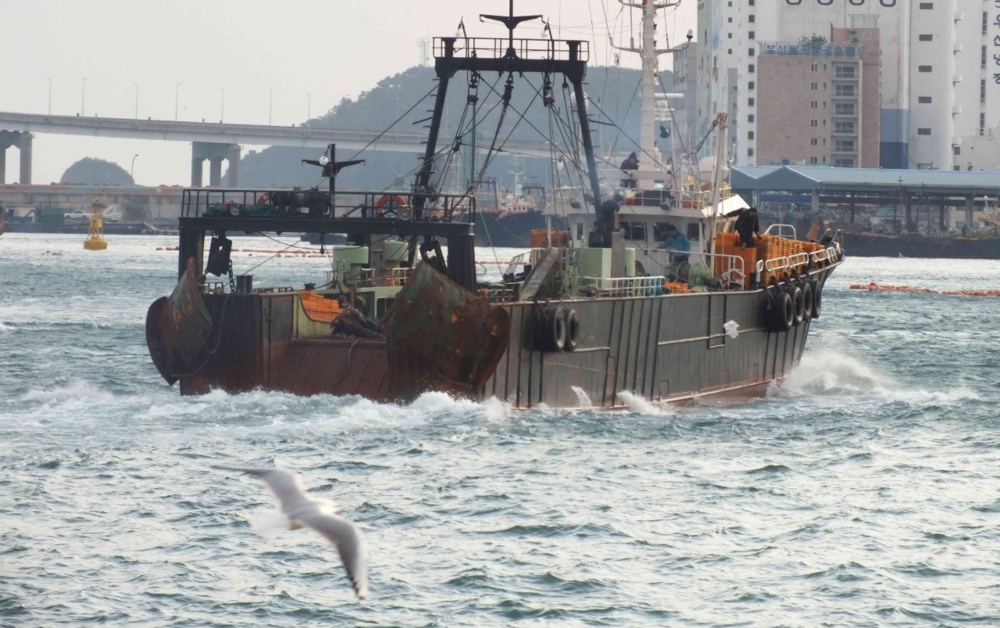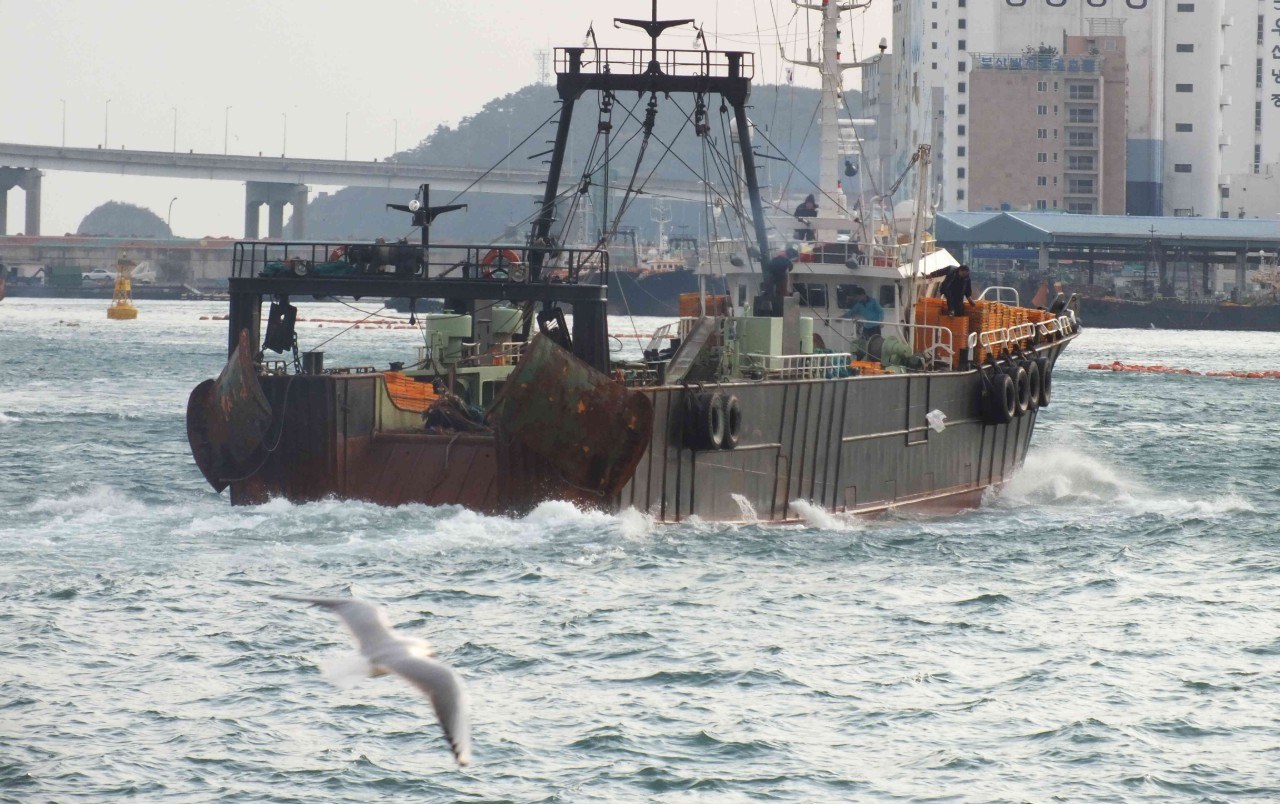
New rules fall short of protecting migrant workers in Korea’s fishing fleet
New rules to protect migrant workers on Korea’s distant water fleet have come into force for 2021. A group of 15 NGOs welcomed the new rules, which came after a major report by the Environmental Justice Foundation (EJF) and the Advocates for Public Interest Law (APIL) revealed widespread human rights abuses on Korean distant water fishing vessels. However, they have warned that there are a significant number of loopholes which continue to leave migrant workers vulnerable to abuse.
Korea’s Ministry of Oceans and Fisheries has announced new rules for the protection of the human rights of migrant fishers on Korea’s distant water fishing fleet, which operates across all the world’s major oceans and is one of the five largest in the world.
The rules, which came into effect in January 2021, govern the recruitment system for migrant workers, prevent excessive working hours, set a minimum salary, and ensure necessities such as clean water.
One of the most important new rules is the requirement that fees charged by manning agencies are borne by the employer, not the worker. In the past, these fees have been used as key means to trap workers into conditions of forced labour as they work off the debt.
However, international and local NGOs have raised concerns that the regulations may still leave workers open to abuse, since, while they stipulate that the recruitment fees must be paid by the employer, it is unclear whether this includes other costs before boarding such as security deposits.
The rules also protect workers’ rights to basic necessities, specifying that clean water will need to be brought onto vessels and distributed in equal amounts to all workers regardless of nationality. But again, the NGO group raised the alarm, pointing out that unless the vessel owner pays for bottled water, it will be difficult for migrant workers on low wages to buy it, and many will still have no choice but to drink badly processed sea water.
On working hours, it was thought that the regulations would be in line with international standards of a guaranteed 10 hours of rest a day and 77 hours a week. However, the new regulation says that breaks can be operated flexibly on a monthly basis, which may be only 6 hours a day, including sleeping time.
The new rules follow a briefing released by EJF and APIL in June that uncovered widespread human rights abuses on Korea’s distant water fishing vessels. The briefing was based on interviews with 54 Indonesians who had worked on 40 Korean vessels. Over a quarter reported experiencing physical abuse, with 63% witnessing verbal abuse. All but two of those interviewed were made to work more than 12 hours a day without a break, with over half working in excess of 18 hours a day. Almost all reported that their passports were confiscated by their captain and several months wages deducted at the start of contracts to discourage them from escaping these abusive environments.
The NGOs say there still remains much to be done. Compliance needs to be strictly monitored by the government and manning agencies breaking the law must be terminated. The ban on charging workers recruitment fees needs to include any pre-recruitment costs, to prevent conditions which enable bonded labor. Other reforms needed are a ban on captains confiscating worker’s passports and the extension of new rules to the large fleet of coastal vessels that fish in Korean waters and are also often dependent on migrant workers.
APIL’s Attorney JongChul Kim said: “These are the most important and detailed measures taken by the government to protect the human rights of migrant workers. They are a positive step, in particular the end of salary deductions and the requirement for a standard contract. However, more needs to be done to bring Korean standards in line with international best practice on a wide range of areas, and we hope this important first step will be followed by further measures.”
EJF’s Executive Director Steve Trent said: “Korea has made significant progress with these new rules. Human rights abuses on fishing vessels are closely linked with illegal fishing and environmental crimes that are decimating our oceans. If left unchecked, they will lead to a downward spiral, as more and more desperate methods are used to take what little remains of key fish populations. It is essential that Korea continues on this important path of reform, closing these loopholes, increasing enforcement and ensuring greater transparency to protect marine environments and the many who depend on them for food and livelihoods. Failure to adopt further reforms and, crucially, to ensure that they are enforced, will lead to yet more crime and abuse, tarnishing the country's reputation”
Editor’s Notes:
Read the EJF/APIL briefing
- The NGOs that assessed the new rules include Human Rights Network for Migrant Fishers Korea (Gyeongju Migrant Labor Center, Gonggam Human Rights Law Foundation, Migrants & Human Rights Institute, St. Jospeh Labor House, Companion-Lawyers for Public Interest, Yoon&Yang Pro Bono Foundation, Advocates for Public Interest Law), Citizens Institute for Environmental Studies, Korean Federation for Environmental Movements, Environmental Justice Foundation, Green Party Korea, Econenia, A Flower Blossom on the Rice, Happy Consumers Cooperatives Union, Jungbu Women's Development Center.
Additional information:
- Regarding minimum wages, the rules will comply with the standards of the International Transport Workers’ Federation, but such levels would still violate the Korean Seafarers Act and the Labor Standards Act, which prohibits discrimination in wages on the basis of nationality.
- The new rules will promote the replacement of crews for those who wish to disembark after a needs assessment, but it is doubtful whether workers will actually use this opportunity because they may be deprived of the opportunity to board again. In addition, migrant fishermen in severe exploitation and human trafficking are not given the opportunity to disembark immediately, but have to wait for one year, so it still does not seem to be an effective measure to prevent human rights violations.
SIGN UP FOR OUR EMAILS AND STAY UP TO DATE WITH EJF

